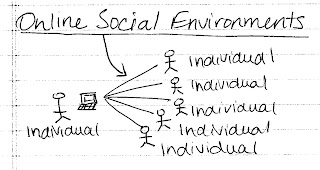Well, I work with college students, and I play video games. But before I went on a rant that this statement couldn't possibly be true, I decided that I would actually research the topic. Do video games represent a barrier for student academic success?
(Disclaimer: to be certain, compulsive video game behaviors do represent very serious barriers to academic and professional development in the same ways that compulsive internet use, gambling, or drug and alcohol addiction would. I hope to address more habitual and casual forms of play in this analysis.)My initial findings were not particularly endearing to my original thesis. In A Study of Time Management, published in 2007 in CyberPsychology & Behavior, researcher Vivek Anand found an inverse trend in grade point averages with higher daily video game usage.
 |
| Graph! |
Anand did note that with the study group, SAT scores were highest among those students who played for approximately 4.5 hours, however "the p value for the correlation between a person's SAT score and video game usage was 0.618, which shows that they are most likely unrelated and thus have no correlation" (Anand, 555).
(In case you haven't been to a stats class forever, but are still reading this, here's what p means.)
However, I have some criticism to Anand's findings (which is easy, since I write a blog, and he is - you know - actually doing research). The data presented does not indicate what types of video games are being played. Due to the Skinner box mechanics of online gaming (and the online social environments therein), online games would represent a far different issue with GPA than offline gaming.
Also, results were not delineated by gender. I, for one, would have liked to have seen whether or not the GPA correlation in gameplay was accurate for both genders, since Anand himself admits to having a higher percentage of male respondents.
If I had hoped a 2010 article in the Journal of Youth and Adolescence titled More Than Just a Game: Video Game and Internet Use During Emerging Adulthood by Laura Padilla-Walker, Larry Nelson, Jason Carroll, and Alexander Jensen would encourage me to think that gaming wasn't a huge concern to college students, I was wrong. "Specifically, regardless of gender, video game use was linked to greater drug use, drinking behaviors, and lower relationship quality with friends and parents" (Padilla-Walker, et. al., 109).
Furthermore, "research suggests that time spent playing video games may also inhibit identity exploration," a complete antithesis to the notion that games can help facilitate identify exploration (Padilla-Walker, et. al. 110).
In fact, the entire article by Padilla-Walker and her team suggests that video games are bad news, not just for academic performance, but for the development of an older adolescent into adulthood! Crud.
 |
| This article does not please me. |
Luckily, I did find an article from CyberPsychology & Behavior by Marko Skoric, Linda Lay Ching Teo, and Rachel Lijie Neo that found a strong causal link between the amount of time playing video game on weekdays and English scores, supporting the notion that Intensive English Language Institute (IELI) students may benefit from playing games in English. So, I am not left wholly disheartened - only mostly.
The findings from the Anand and Padilla-Walker studies are both pretty directional into my understanding of one very important thing: we've got a long way to go in understanding how video games impact academic performance. While neither study had great things to say, they were also both quick to establish that they are trailblazers in this area of research, and that without more studies, there could be no conclusions drawn.
If video games are a significant impediment to academic success (research seems to be leaning this way), it would behoove those of us who are assigned the task of removing barriers success to know a little more about them, and a little more on how we can employ harm reduction techniques to make education a priority, and gaming a recreational activity.
But until more research can be done, I guess we'll just wait.



